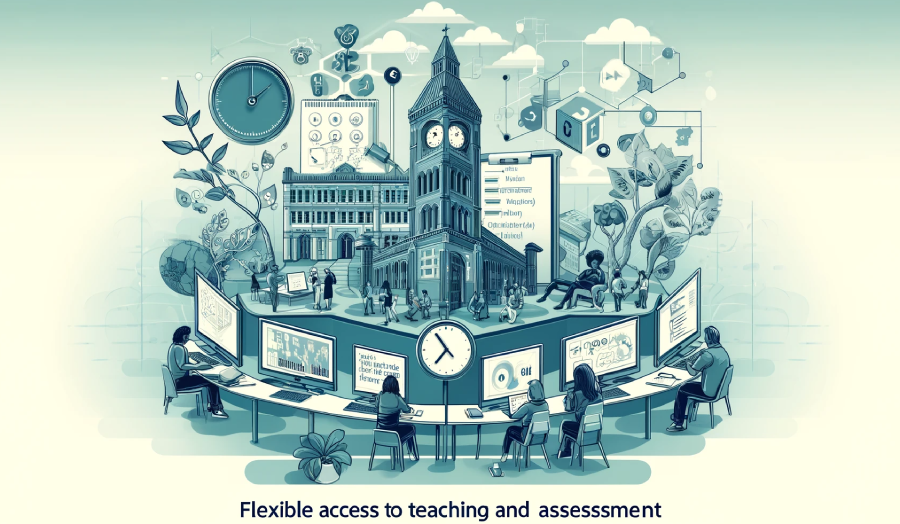What is the challenge being addressed?
London Met offers one of the few (the only MA for Conference Interpreting in London) interpretation courses at postgraduate level in the country. Students are attracted to the course from a wide geographical area including continental Europe. Commuting to onsite classes is therefore a major challenge for many students. Online learning is not new but was developed and adopted considerably during Covid. The challenge was to create the opportunity for students to have a completely flexible choice as to whether they attended classes on site or online. This would not only benefit those students with a difficult commute but any students who had difficulty attending on site classes from time to time because of caring commitments, mobility issues, illness etc. This would enable students to succeed and have a positive student experience regardless of personal circumstances.
What did we do?
Students were brought together to discuss the requirements of the course and the technological needs. A technological solution was developed to provide hybrid synchronous teaching and learning for every teaching session giving students complete freedom to attend online or onsite on any occasion. Care was taken to understand how online access was mediated through the variety of mobile phones, tablets or laptops. This gave students confidence and ensured that all students had the same experience and equal opportunity to engage in the class. Care was taken to build a community of practice. Having a space with a clear identity, the interpreting suite, and providing an adjacent social space was important to building trust and support in the group.
Students were also given the option of taking their interpretation exams on line online or onsite in a synchronous way, all together as one community. Guidelines and principles were established together with the students. Exams were rehearsed with the hybrid technology during our practice.
What happened? or what was the impact?
No formal assessment has been carried out but there has been full attendance and participation in the course. There is a number of indicators of the positive impact of the hybrid approach:
During the course follow up , students said that the flexibility in the course was an asset. Without it, they would not have been able to follow the course as they have done so far. Students can decide to be online or onsite without explanation or justification. They know they are trusted. They understand the benefits of being online and onsite and act accordingly which is very empowering.
- a BA Translation student who works 6 days a week would have had to travel 3 hours return to attend a 2 hour session on his day off. As he was online, he explained he could enjoy the course and rest to recover from work and his studies He was feeling positive and motivated
- An MACI student had to have an operation abroad but did not miss a single lesson and was able to stay in touch with the group
- A mother who had to spend some time at home to manage some problems with her child’s schooling was able to continue with the course
- Students who preferred to be onsite did so because:
- they preferred to be in a professional setting
- they wanted to feel the support of their peers
- they were reassured someone could help with the technology if they were in trouble.
- Students who took the exam online preferred to do so because of:
- fear to arrive late as they lived very far away
- stress management. They felt more relaxed at home.
Two students are writing dissertations comparing outcomes online and in person.
Could the practice change be rolled out more widely?
Hybrid pedagogies are relatively new and need to be explored further. There are technological challenges but those with experience should be able to share knowledge and work together to continue to develop solutions adapted to the students, the subject and the space.
The technology needs to be adapted to suit students, staff and space. Having a space which ‘belongs’ to a community makes it easier to operate and develop but may not always be possible.
Hybrid teaching is an opportunity to engage students into a reality which is already the reality of the work market. However, it may be more difficult to extend hybrid working to exams in some areas. It is very hard to cheat in interpretation exams.

Academic Lead: Associate Professor Dr Danielle D’Hayer
School: Guildhall School of Business and Law
Course Leader: MA Conference Interpreting, MA Interpreting
Key links
Lubicz-Nawrocka, T., Owen, J., (2022) Curriculum Co‑creation in a Postdigital World: Advancing Networked Learning and Engagement
Community of Practice
Our online interpreting exam experience: students as partners
Rising to the challenge with pride: a community of practice at work
Student as Partners
Contact details
Email: d.dhayer@londonmet.ac.uk
